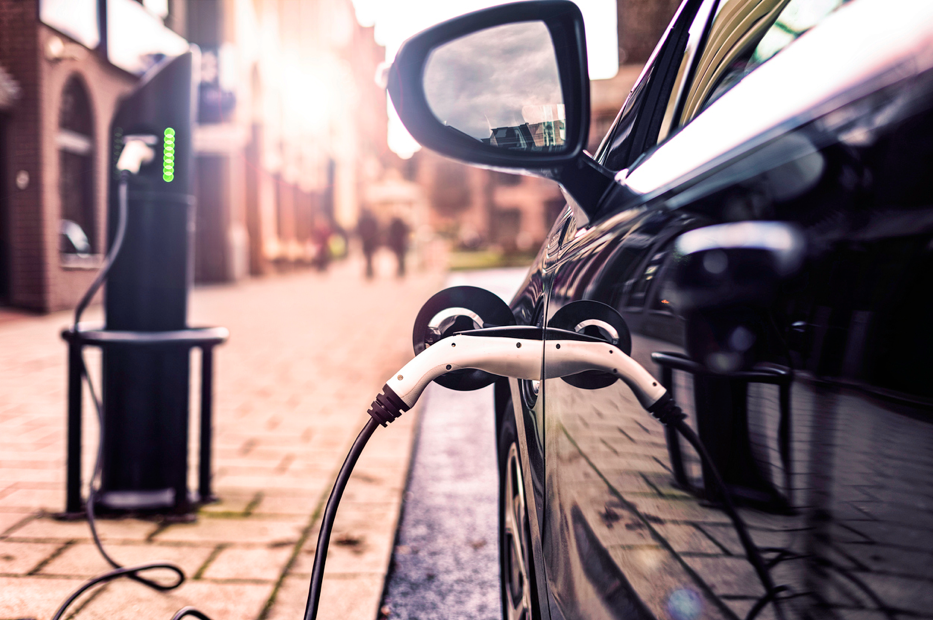
It’s no secret Australians love their cars. With some of the most stunning driving routes in the world in our back yard, it’s not hard to see why.
Despite an enthusiasm for the road, the Australian motoring industry is lagging behind when it comes to the uptake of electric cars.
The motoring industry in Australia is quite healthy with 1.15 million cars sold overall in Australia in 2018, but only 1,350 were plug-in electric vehicles.
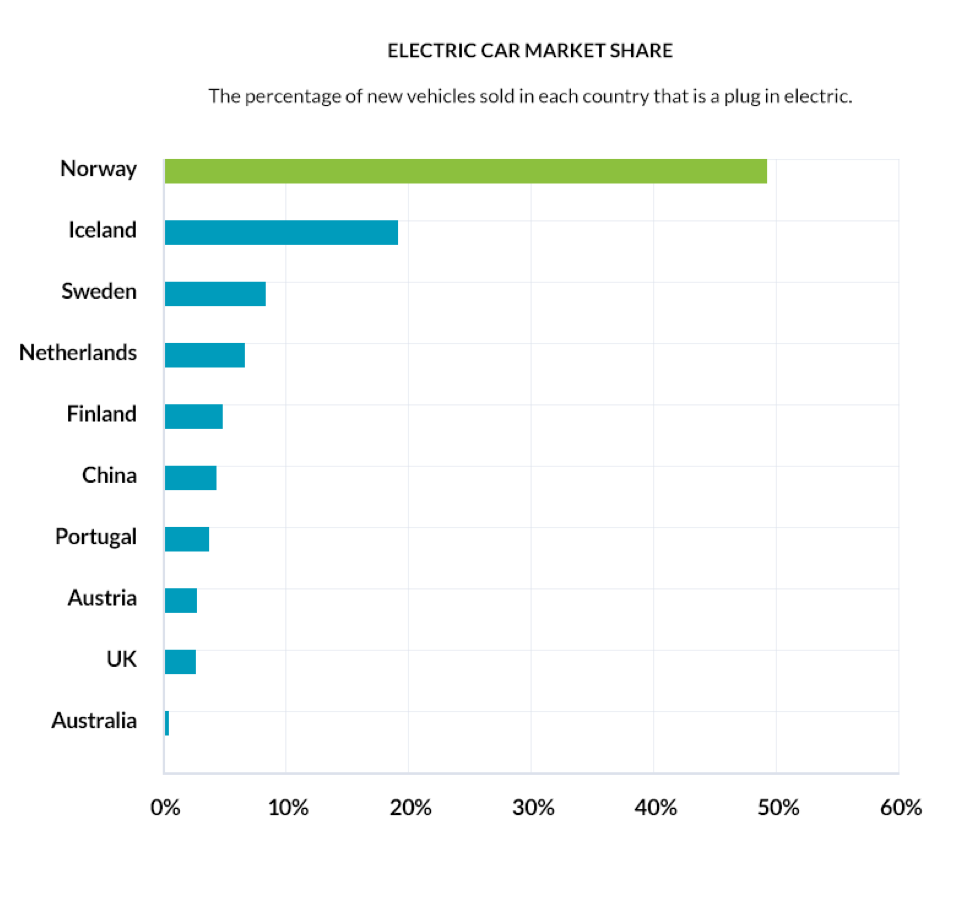
The electric car market share in Australia is negligible, and pales in comparison to countries like the UK, China, Sweden and, in particular, Norway – the world’s leader in electric vehicle ownership per capita.
So why has the electric car failed to appeal to Australians like it has for so many other developed nations?
Up-front cost is one the most common complaints directed towards electric cars. Put simply, many are too expensive for mid to low level earners to afford without substantial credit commitments.
Here are some examples we researched through Auto Trader.
| Make/Model | Fuel | Transmission | Est. Cost | Distance |
|---|---|---|---|---|
| 2014 Nissan Leaf ZEO | Electric | Automatic | $16,500 (excl. gov charges) | 71,000km |
| 2015 BMW i3 I0l | Electric | Automatic | $39,900 | 44,599km |
| 2015 Holden Barina | Petrol | Automatic | $5,700 | 44,123km |
| 2016 Ford Fiesta | Petrol | Automatic | $13,990 | 41,739km |
Not only do petrol cars of a similar age and mileage cost substantially less than electric counterparts, there is also a greater range of prices, with some as low as $5,700. This cheap and cheerful option does not appear to exist for electric cars currently, effectively pricing lower earners out of ownership.
It must be noted that petrol cars will have higher running costs, including fuel consumption. See later in this article for more on that.
In 2010, the Mitsubishi i-Miev was released. A fully electric city hatchback with a range of 160km and a top speed of 130km/h. On release, the i-Miev cost around $49,000.
Another example is the Nissan Leaf 2011, which was priced at around three times the cost of a similar-size petrol-powered Mazda3.
Mike Sinclair, editor of Carsales.com.au, predicted this year that electric car costs will moderate, but they will not become cheap. Electric vehicles do vary in cost, but you can expect to pay between $49,000 up to figures in excess of $100,000 for new models.
Experts predict that a greater range of electric cars priced at less than $49,000 will be available over the next three to five years. They also forecast that the crossover point in price between EVs and non-EVs could be as far away as 2030. This is quite a long time.
Availability is another simple but crucial factor in the lack of electric cars being sold in Australia.
We used Auto Trader to conduct a car search in the Sydney area, with prices set to between $5,000 and $30,000. This price range covers a vast number of affordable used petrol and diesel cars.
Here is what we found.
| Fuel Type | Cars Available | Lowest Price |
|---|---|---|
| Unleaded | 5,379 | $5,000 |
| Diesel | 2,230 | $5,000 |
| Electric | 16 | $18,888 |
| Hybrid | 54 | $5,000 |
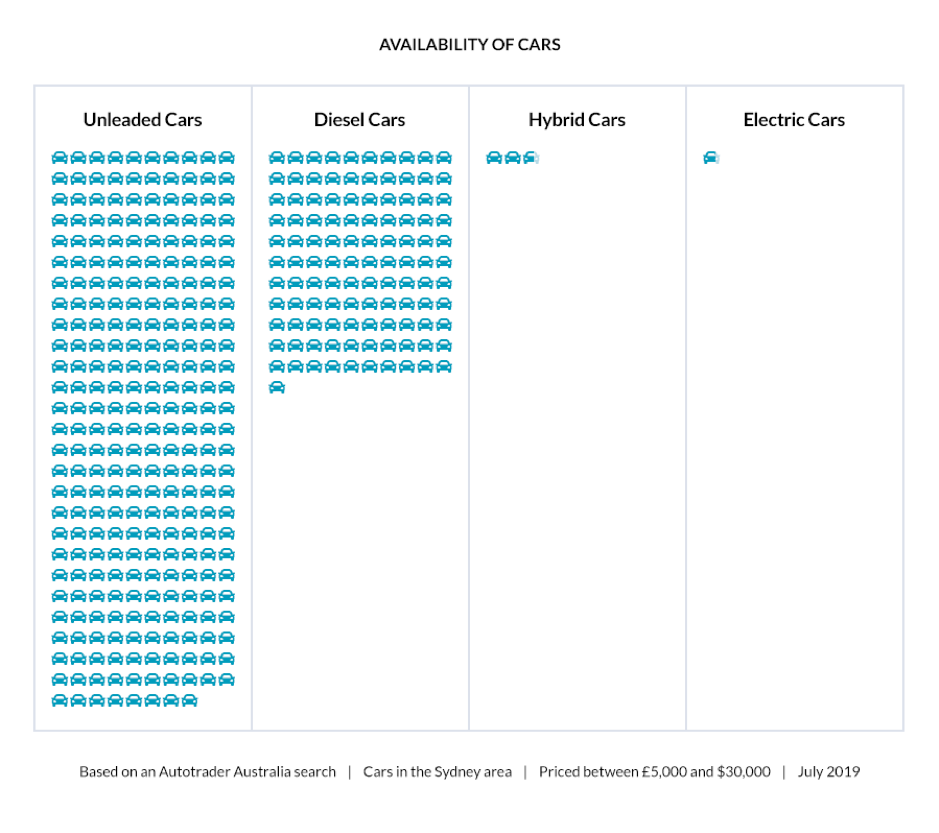
At the point of searching, there were only 16 fully electric cars listed in the Sydney area, compared with over 5,000 unleaded, and over 2,200 diesels.
Range anxiety is the stress or concern of an electric car driver that their power supply will run out before they have reached their destination or charging point. It is a commonly cited issue for some and a big red flag for others.
The 2013 Nissan Leaf sells used for up to $19,000* and has an advertised full-charge range of up to 190km. Conversely, the 2012 Ford Focus Titanium Turbo Diesel will travel up to 1,090km on a single tank. It could also cost you $4,000 less to buy as of August 2019.
Australia is the 6th largest country in the world, and there are some pretty vast distances between main settlements. Even the distance between Sydney and nearby Canberra is nearly 300km. As a sparsely populated country, it stands to reason that range anxiety is a much bigger turnoff in Australia than more compact countries.
*Autotrader – Nissan leaf X AZEO – August 2019 listing – $18,990 – 83,734km driven
Many other countries have been moving to incentivise electric car ownership with a variety of policies. This is something that is still lacking for Australian drivers.
In the UK, for example, cars with zero emissions pay zero road tax, while ‘dirty’ cars with higher emissions are taxed heavily.
A diesel car with CO2 emissions between 151-170g/km will incur a first year road tax payment of £530 ($940), followed by annual payments of £145 ($257). Over 5 years, this is a saving of over £1,100 ($1,954) in road tax alone. By appealing to the wallets of vehicle owners, the UK government is greatly incentivising electric car ownership.
The Norwegian government also provide some highly lucrative incentives for EV owners, including exemption from high import and purchase taxes, VAT and road tax. Electric car owners even a free pass for road tolls and bus lanes and can enjoy free municipal parking in cities. It isn’t difficult to see why they are the world leaders in electric car ownership.
Here is where the real savings can be found. Electric cars are advertised as being far cheaper to fuel over the long term. So how much cheaper are they?
To find out, we have looked at two popular hatchbacks which are similar in cost, size and function: the 2012 Nissan Leaf and the 2015 Holden Barina. The average mileage for small vehicles in Australia is 13,500km.
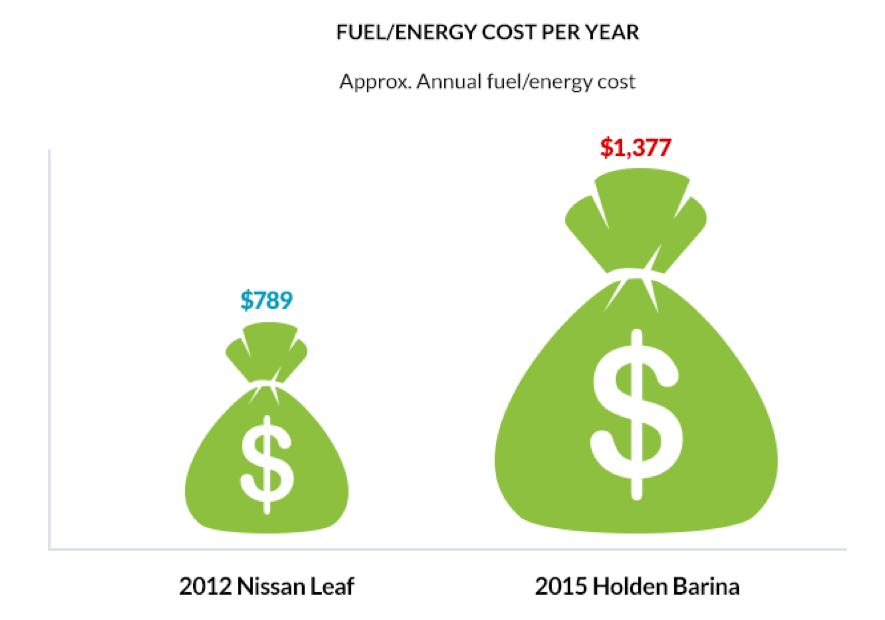
In fuel costs, the petrol car may cost around 75% more (+$588) each year. Over the course of five years, that’s nearly $3,000 in fuel savings.
| Years of Ownership | Approx. fuel Savings* |
|---|---|
| 1 | $588 |
| 3 | $1,764 |
| 5 | $2,940 |
| 7 | $4,116 |
| 10 | $5,580 |
*based on an average petrol cost of $1.50 per litre, an average electricity cost of $0.25 per kWh and an average annual mileage of 13,500km
The key selling point of an electric car, besides the environmental impact, is the long term cost-effectiveness compared with petrol or diesel vehicles.
One area where running costs can vary dramatically by fuel type is registration fees.
There are different registration costs by state, so we will look at Queensland as an example.
According to the Queensland government website, the following registration costs can be expected.
| Car Value | Electric or Hybrid | 1-4 Cylinders | 5-6 Cylinders | 7+ Cylinders |
|---|---|---|---|---|
| $6,000 | $120 | $180 | $210 | $240 |
| $10,000 | $200 | $300 | $350 | $400 |
| $15,000 | $300 | $450 | $525 | $600 |
| $20,000 | $400 | $600 | $700 | $800 |
| $25,000 | $500 | $750 | $875 | $1,000 |
| $35,000 | $700 | $1,050 | $1,225 | $1,400 |
| $50,000 | $1,000 | $1,500 | $1,750 | $2,000 |
With a 5-6 cylinder petrol or diesel car costing $375.00 more to register than an equivalent electric vehicle, there are clear savings to be made here.
This is a good start in terms of government incentives, but more must be done.
There are plenty of reasons why Australia is lagging behind in the race for emissions free motoring. The most glaring of these appears to be a general lack of proactive government policy. Experts estimate that it may take until 2027 for the uptake in electric cars to become significant in Australia.
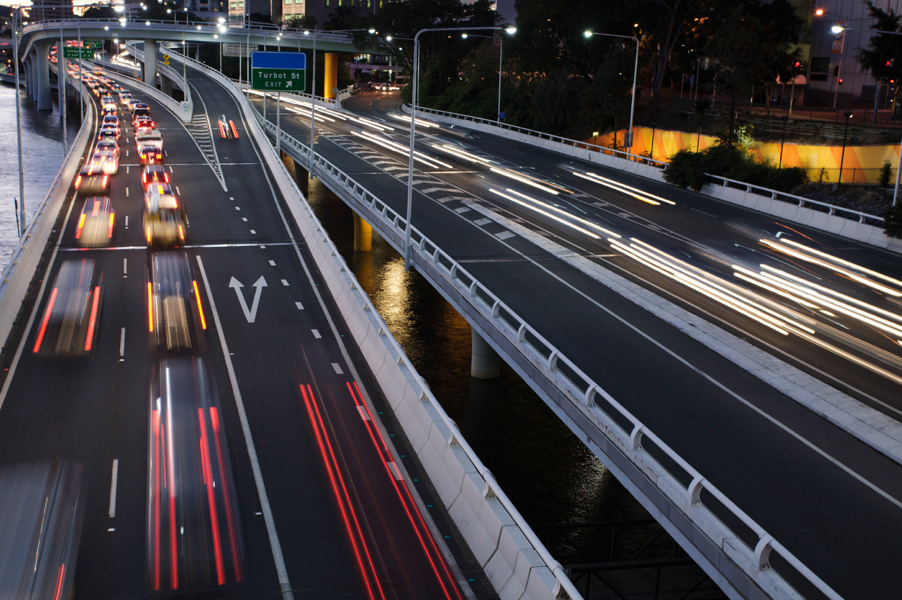
It is clear that the government must do more to encourage Aussie motorists to make the switch. By improving the availability of affordable electric vehicles, providing more significant financial incentives, and solving the issue of range anxiety through improved availability of charging points, the government has the power to make a big difference.




